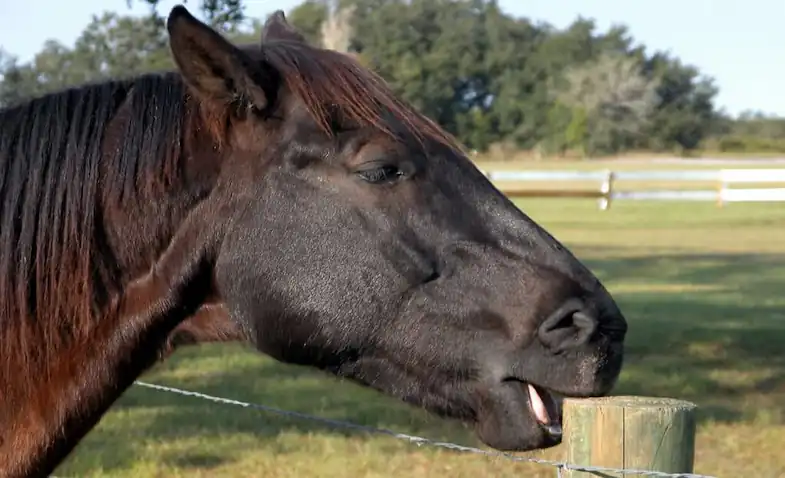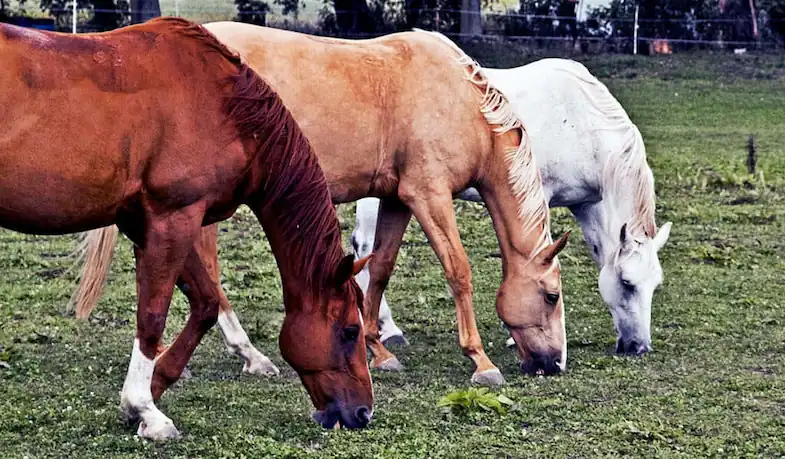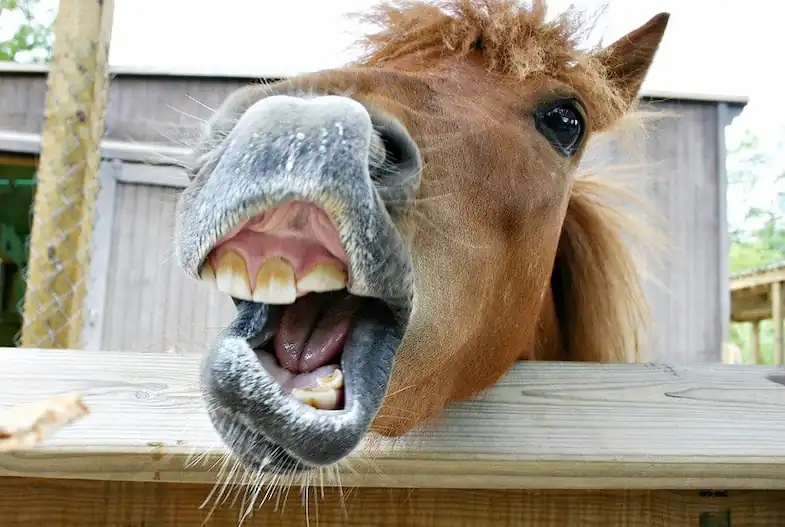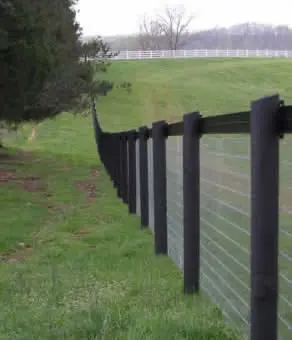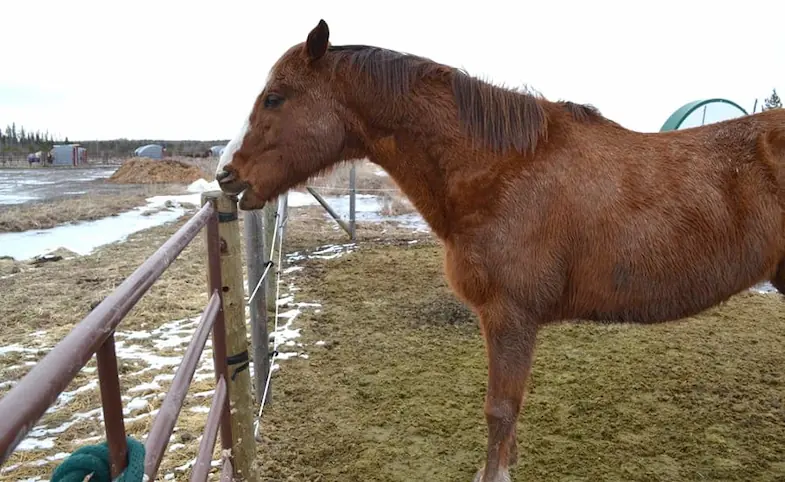While many owners may consider a horse chewing wood to be nothing more than an annoying nuisance, if it’s your horse though, and it’s the first time he’s done it, it can be a real worry and a cause for concern. This can be even more worrying if your horse is young though, after all, nobody wants their horse to become a chewer (or a beaver as they’re sometimes known). The real question that most people will be asking though is why is my horse chewing wood and how do I stop it?
Why do young horses chew wood? There can be any number of reasons (such as boredom, nutrient deficiency, or even just habit) why horses start to chew wood but when it comes to young horses (those under the age of 5) they can often start chewing wood because they’re still teething.
Nobody will disagree when I say that chewing wood isn’t a natural behavior but what might surprise you is that there has never been a single recorded case of a wild horse chewing wood. While we obviously can’t monitor wild horses 24/7 we can investigate their surroundings (as well as their teeth) for signs of this behavior yet none have ever been found which indicates that this is only present in domesticated horses, but why? Of course, we can’t replicate how they live in the wild completely but if we understand what the primary cause for chewing wood is we can address this and hopefully, over time, eradicate the behavior.
Why do young horses chew wood?
Like all equine behavior, there can be many reasons for every action, and wood chewing is no different but it can be particularly troubling in young horses.
- Developing teeth – The most common reason for your horse to chew wood is that their teeth are still growing. Just as with humans, this can cause a lot of pain and discomfort and while babies would cry or chew a soother, horses turn to chewing wood to ease this.
- Boredom – If your horse is on box rest or doesn’t have contact with other horses (or other companions) then he’s likely to become bored so can start chewing wood in order to pass the time. This can also happen if a horse is mainly fed concentrates and not able to forage.
- Depression – Boredom in horses can, if not dealt with, lead to the horse suffering from depression, this, in turn, can manifest itself in the horse chewing wood.
- Lack of nutrients – While wood (whether it’s a fence post or a living tree) isn’t known for its nutritional value (unless it’s a Christmas tree) but if a horse isn’t getting enough vitamins and minerals from its diet then it’ll try and get those from its surroundings, including wood.
- Habit – If your horse continues to chew wood after you’ve addressed all causes then it’s because he’s in the habit of doing so and may even find comfort in chewing the wood.
- Learned – Horses are very sociable animals and will sometimes copy each other’s behavior. One horse may see another chewing wood and decide to give it a try themselves.
- Cribbing – While crib biting and wood chewing are two different behaviors some horses that crib bite will also chew the wood too.
Why is chewing wood a problem?
There’s a reason why chewing wood is classed as a vice rather than just a quirky behavioral characteristic, yes it can be extremely costly if you’re forever having to replace fencing but on top of the obvious nuisance and headache it causes us, it’s not a good habit for your horse either.
Research has shown that chewing wood doesn’t have a long-term impact on a horse’s health but that doesn’t mean to say it won’t adversely affect it. After all, if your horse is a persistent chewer then it stands to reason that he’ll eat a certain amount of wood in the form of splinters and smaller chunks. While these will pass through his digestive system without any problems they can, in some cases lead to bouts of colic. There is also the very real possibility that some of these splintered pieces of wood could puncture the wall of the intestine if they’re sharp enough. This can lead to infection and other more serious health complications.
It’s not uncommon for small pieces of wood to get stuck in between a horse’s teeth, if not removed promptly these can irritate your horse and make it painful for him to eat properly. Chewing wood can also cause unnatural, and excessive, wear on your horse’s teeth, especially on their incisors. This water can reduce their ability to chew their food properly which can lead to a loss of condition.
While it’s natural for a young horse to try and ease the discomfort they’re suffering from teething doing so by chewing wood can, if they do it often enough, result in their incisors (the teeth at the front of the mouth) becoming deformed and growing outwards. While this is unlikely to be a problem with their milk (or deciduous) teeth it can result in their adult (or permanent) teeth being more prominent.
How do I stop my horse from chewing wood?
It can be really frustrating if your horse is a chewer, not only is he at a greater risk of colic but it can become really expensive if you’ve got to replaced fencing and repair stall doors all of the time, and let’s be honest the noise of a horse chewing can get pretty annoying if you’re forced to listen to it day after day.
It’s important to address the reason why your horse is chewing wood first, otherwise, he’ll just find something else to distract, occupy or nourish him depending on why he’s doing it.
Have your horse’s teeth checked regularly
Growing teeth is the most common reason for young horses chewing wood which is one of the reasons why it’s so important to have them checked regularly. Your veterinarian or equine dentist will be able to tell you if your horse is chewing wood because of his teeth. They may also give you a soothing gel or rubber chewer to help ease the discomfort your horse is feeling.
Daily turn out
Horses need to graze and mix with other horses, it’s part of what makes them a horse. If your horse is cooped up in his stall for most of the day then he can start to develop vices such as chewing wood. This is because he’s bored and looking for something to do. Turning your horse out regularly will give him the chance to graze and investigate his surroundings which will keep him occupied and hopefully not chewing wood.
This is even more important for younger horses who have a lot more energy and are far more inquisitive than older horses. Turning them out regularly will give them the chance to run off some of their excess energy but also explore their environment.
Socialize your horse
It might sound silly to say that you need to socialize your horse but what I mean is allow your horse to spend time with and around other horses. Spending time with other horses will give your horse a chance to become part of a herd and benefit from mutual grooming both of which help to keep your horse’s stress levels low. He’ll also be more relaxed too because he’ll feel safer knowing that somebody is looking out for danger while he’s grazing.
Socializing with other horses is especially important for younger horses too because it gives them a chance to understand what being a horse means while they’re still young and able to learn. They’ll then grow up with a firm grasp of what other horses are saying and how to respond.
Make sure your horse is getting enough from his diet
While wood isn’t particularly nutritious if your horse isn’t getting what he needs from his normal diet he will start to look for it elsewhere and unfortunately your fence posts are just one of those places. Many horses have access to salt blocks but I’ve personally found that mineral blocks are far better. While salt will, unsurprisingly, only top up your horse’s salt levels, a mineral block will give all of their vitamins and minerals a boost.
Feed balancers can also be good at topping up your horse’s diet, they’re packed full of all of the vitamins, minerals, and macronutrients that your horse needs but because they’re designed for easy keepers they won’t increase his calorie intake too much.
Keep your horse occupied
As well as regular turn out giving your horse toys to play with can be a great way to keep them occupied, personally, I’ve found the ones that offer treats to not be very effective (the horses usually just want the treat and can’t be bothered working for it) but other toys such as Bizzy Bites are perfect. I always buy mine from Amazon because they’ve always got plenty of stock and offer super quick delivery.
Stop the habit
Don’t worry if you’ve done everything you can to make sure your horse has enough turn out time, that he’s getting all he needs from his diet and he’s not bored or stressed but he’s still chewing the wood. Depending nohow long your horse has been doing for it can become habitual and, while there’s no miracle cure that will stop all horses immediately there are still plenty of things you can do to break the habit.
Creocote – While the use of creosote is restricted in many countries creocote isn’t (just in case you were wondering creosote is coal-based tar while creocote is an oil-based wood preserver) and is very good and deterring your horse from chewing his paddock fencing. This has a strong taste and horses don’t like it (even the smell is enough to stop most horses chewing) but the downside to creosote though is that it stains easily and your horse will undoubtedly brush against it.
Lots of companies make creocote and they’re all pretty good but I’ve found Woodcut’s CreoCoat to be the best, it gives a great finish and is especially good when you’re using it to stop your horse chewing wood. It’s available at most hardware stores but I found the best price on Amazon.
Cover with metal – If your horse is chewing on trees or fence posts this isn’t going to be possible but if it’s his stall that he’s chewing then a thin strip of metal along the edges will immediately stop him from chewing the wood. The only drawback to this though is that some horses develop a taste for the tangy metal and then continue to try to chew it, however, this is better for their digestion than chewing wood so in my book it’s a small price to pay.
Chicken wire – Putting small-mesh chicken wire around fence posts (or whatever your horse is chewing it will help to protect the wood. Unlike covering the wood with metal, horses don’t tend to like the feel of the mesh against their teeth so are unlikely to like the taste and therefore will normally give up trying to change the wood. As an added bonus it can help to protect the wood if your horse rubs against it too.
Electrical tape – This can be extremely time-consuming (especially if you have a large paddock) but wrapping electrical tape around all of the fencing will mean that your horse simply won’t be able to chew the wood. You don’t have to use electrical tape but because it’s designed to be very adhesive and tough most horses won’t chew through it.
Electric ‘hot wire’ fence – This isn’t quite a full-on electric fence, instead it’s a single wire that’s placed just in front of where your horse chews. The voltage is low so he’ll only get a tingle when he touches it but in a lot of cases, this is enough to stop a horse chewing, or at least make them think twice before doing it again. May electric fences can run off of a small vehicle battery so you can still use it if you don’t have outside power.
Remember though that all horses are different and that what works for one horse won’t necessarily work for another, if something doesn’t work move onto something else until you find what works for your horse.
Why do some horses chew wood more during the winter?
You may have noticed that your horse chews wood a lot more during the cold (and often wet) winter months and wondered why he was doing this but don’t worry, recent research has shown that this is actually far more common than you might think.
Of course, grass doesn’t hibernate during the winter but it does instead reduce the amount of nutrition it produces and the little that’s left is harder to get to, either because it’s underwater or frozen solid. This lack of nutrients means that some horses will start chewing wood (or return to it) in an attempt to try and top up their diet.
If your horse isn’t normally a chewer but does (or does it more often) during the winter then make sure he has enough forage and that what he does have has enough nutrition to boost what he’s lacking from natural grazing.
There are two things to consider when using the same bit for multiple horses, the fit of the bit and any health issues the horse has. When it comes to the fit, it’s crucial that it’s right for both horses and doesn’t pinch at all. That said though if one of the horses has a contagious health issue they will pass it on to other horses using the same mouthpiece. With this in mind, you can use the same bit but it’s not advisable.
Related questions
How is wood chewing different to crib biting?
Many people confuse wood chewing with crib biting but they’re actually very different, horses that chew wood are literally biting off pieces of wood and eating them whereas horses that crib bite use the wood as a purchase in order to arch their neck and gulp in air.
Why do horses chew their feed and water buckets?
The plastic that most buckets are made from can act as a soother for some horses but more often than not horses chew their buckets in anticipation of food. They’ve learned that in order to get food you need to pick their bucket up so they start out by trying to ‘help’ you although this can develop into a habit too.
Why do horses eat their bedding?
Believe it or not but some horses actually enjoy the taste of their bedding although in the vast majority of cases it’s because they’re not getting all of the nutrition they need from their diet. The best way of dealing with this is to use a mineral block.
Further reading
- Why do horses windsuck?
- Do horses get depressed?
- Do horses need supplements?
- Why do horses roll?
- Protecting your horse from sunburn
- How to prevent loneliness in horses
- Keeping a horse on a budget
- Improve your horse’s suppleness
- Caring for a pregnant horse
- Why equine flu is so serious
I hope you found this article helpful. If you did I’d be grateful if you could share it please as it would really help me.
Recommended products
Over the years I have tried hundreds of different horsey products, from various blankets and halters to different treats. Some I’ve loved, others I’ve hated but I thought I’d share with you my top all-time favorite products, the ones I never leave the yard without. I’ve included links to the products (which are in no particular order) that I really think are great.
- Horse Knots by Reference Ready – If you’re like me and enjoy pocket reference guides then you’ll love this knot tying guide. These handy cards can easily fit in your pocket or attach to the saddle for quick reference. They’re waterproof, durable and are color coded to make them easy to follow.
- Mane ’n Tail Detangler – Even if you never show your horse you’ll need to detangle his tail from time to time (and possibly his mane too) which is always a challenging chore! I’ve found that if I run a little bit of detangler through my horse’s tails every few days it stops them from getting matted up and makes combing them easy, even if they’re coated in mud. I don’t know if I should admit to this or not but it also works wonders on my hair.
- TAKEKIT Pro clippers – Over the years I’ve tried a lot of different clippers and while some were obviously better than others I found these to be by far the best. They are heavier than a lot of other clippers but for me, that’s a good thing, it makes them feel more sturdy and hardwearing. On top of that they have a range of speeds so are just as good for clipping your horse’s back as they are his face. I also like the fact that they come in a handy carry case but that’s not for everybody. The company that makes them is super good and incredibly helpful too, a real bonus these days. The only thing I wasn’t keen on was the fact that it doesn’t come with any oil, but that’s not a major problem as it’s not difficult to buy lubricant.
- Shire’s ball feeder – There are so many boredom buster toys out there but I like to use these every day, regardless of whether or not my horses are bored. I find that it helps to encourage my horses to problem solve by rewarding them with treats (or pieces of fruit) but it also mimics their natural grazing behavior which helps to keep them calm and de-stressed.
- Horse safe mirror – This is a strange one that many people are surprised about but I like to put horse safe mirrors in the trailers as well as in the quarantine stalls. It helps to prevent the feeling of isolation by giving the impression of other horses being around. Being herd animals horses can get extremely stressed when they feel that they’re on their own but with these stick-on mirrors, they believe that at least one other horse is with them.
- Rectal thermometer – I know this isn’t glamourous at all but it’s vital for your horse’s well-being to be able to check their temperature and a rectal thermometer is the easiest way of doing this which is why I’ve added it to the list.
Shopping lists
I’ve also put together a few shopping lists of essential items that I’ve found helpful over the years. I’ve broken the lists down into different categories rather than put everything in one massive list 😉

